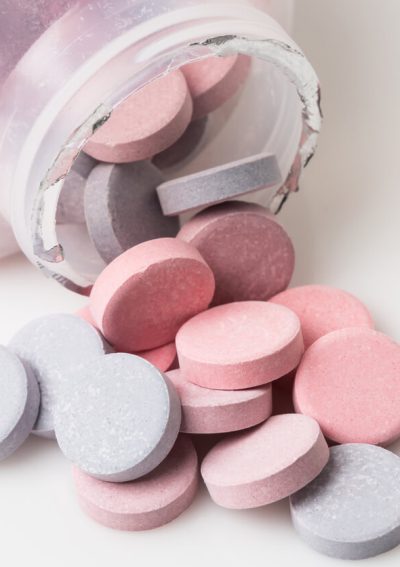Proton Pump Inhibitor Alternatives
Proton pump inhibitors are medications that limit the stomach’s acid production. People use these drugs to treat heartburn, acid reflux and other gastrointestinal issues excess stomach acid can cause. To avoid adverse effects, however, many people seek proton pump inhibitor alternatives.

Why Are People Using Alternatives to Proton Pump Inhibitors?
Proton pump inhibitors are the most commonly prescribed medications in the U.S., but several studies have raised the possibility that long-term PPI use could lead to serious side effects. As of May 2023, there have been more than 18,600 proton pump inhibitor lawsuits for severe adverse effects such as bone fractures, gastric cancer and chronic kidney disease, as well as an increased risk of heart attack.
- Acute interstitial nephritis (an allergic reaction that causes kidney tubules to swell)
- Clostridium difficile infections
- Esophageal and gastric cancer
- Heart attacks
- Hip, spine and wrist fractures
- Kidney disease, injury and failure
- Pneumonia
- Stroke
Consumers should also be aware of possible drug interactions with proton pump inhibitors. Clinical trials have indicated possible adverse effects when combining PPIs with the antiplatelet drug clopidogrel, including a higher risk of cardiovascular issues.
PPIs also elevate the pH balance of stomach acid (or intragastric pH levels). They can interfere with the body’s ability to absorb certain medications and reduce the bioavailability of several drugs.
Are Antacids the Most Commonly Used PPI Alternatives?
A recent market analysis predicted the antacid market size to grow from $7 billion in 2021 to $10 billion in 2029, clearly indicating that antacids are popular alternatives to proton pump inhibitors. Antacids are available over the counter as chewable tablets or a liquid that neutralizes stomach acid. This type of medication is available from several brands:
- Alka-Seltzer
- Calci-Chew
- Di-Gel
- Gaviscon
- Gelusil
- Maalox
- Mintox
- Mylanta
- Pedia-Lax
- Phillips' Milk of Magnesia
- Rolaids
- Titralac
- Tums
While antacids can provide relief from heartburn and other symptoms of gastroesophageal reflux disease, there are limitations. These OTC formulas are often ineffective at managing serious GERD symptoms and cannot treat underlying causes of indigestion and discomfort, such a stomach ulcer or gallbladder disease.
There are several possible side effects of antacids, which vary depending on the ingredients used. Magnesium most commonly causes diarrhea, while calcium and aluminum commonly cause constipation. In rare cases calcium also causes kidney stones. Aluminum taken in large amounts can cause calcium loss.
Pros and Cons of H2 Blockers as PPI Alternatives
H2 blockers are another medication people often use as alternatives to proton pump inhibitors. These medications reduce stomach acid production from glands in the stomach’s lining and are available over the counter or as a prescription.
- Providing quick relief within 60 minutes
- Improving symptoms for up to 24 hours
- Relieving symptoms of GERD
- Treating a stomach or peptic ulcer
- Decreasing production of acid in the evening
- Potential side effects such as headache, diarrhea, skin rashes or dizziness
- Higher risk for adults over 50 or those with kidney problems
- Reduced breast milk production
- Possible interactions with pain relief medications
- Not ideal for long-term treatment
In clinical trials of H2 blocker nizatidine oral solution, for example, some people experienced side effects, including anemia and impotence. The U.S. Food and Drug Administration reports that Amneal Pharmaceuticals issued a voluntary recall in April 2020 for its nizatidine oral solution because of unacceptable levels of N-nitrosodimethylamine. NDMA contamination also prompted the recall of Zantac.
Prescription Alternatives to PPIs
There are several other prescription drugs that offer similar benefits as PPIs. These proton pump inhibitor alternatives include medications such as antibiotics, ulcer-treating protectants, skeletal muscle relaxers and synthetic hormone-like substances.
| Drug | Brand Name | Used To Treat | Side Effects |
|---|---|---|---|
| Baclofen | Fleqsuvy, Lyvispah and Ozobox | Muscle stiffness, spinal cord diseases and refractory GERD | Dizziness, nausea, constipation, headaches, weakness, insomnia, fatigue, frequent urination, confusion, hallucinations and seizures |
| Misoprostol | Cytotec | Ulcers | Headache, indigestion, constipation, gas, diarrhea, stomach pain and vomiting |
| Sucralfate | Carafate | Duodenal ulcers | Constipation, swelling of the face or mouth, breathing difficulty, itching, rash, hives and swallowing difficulty |
These medications all require a prescription from a doctor and can help provide treatment for GERD, ulcers and related gastrointestinal issues. Some of these prescriptions are used in conjunction with one another or other drugs, such as antibiotics, to provide relief and treat underlying conditions.
Natural Proton Pump Inhibitor Alternatives
A GERD diet is a popular natural alternative to proton pump inhibitors that can help reduce stomach acid and minimize gastrointestinal discomfort. Avoiding foods and beverages that can trigger or worsen symptoms includes eliminating certain acidic foods.
Foods that can worsen heartburn and indigestion include greasy meals, caffeine, peppermint, onions, carbonated drinks, alcohol, citrus fruits and tomatoes. GERD diets focus on consuming lean proteins, fruits and vegetables, complex carbohydrates and unsaturated fats. Additionally, sitting upright after eating and avoiding meals right before bed can help limit discomfort.
There are several herbal remedies and supplements on the market sold as natural alternatives to proton pump inhibitors. However, the FDA doesn’t regulate these products as medications. They’re regulated as food. Consumers should exercise caution with supplements and other homeopathic or herbal products and speak with their doctors before trying them.
When Should I See a Doctor for GERD?
While symptoms of acid reflux, such as heartburn or regurgitation, may be common, medical treatment may become necessary to find relief. If symptoms of GERD persist after trying dietary changes or over-the-counter medications, you should consult your doctor.
- Appetite loss
- Chronic or severe chest pain
- Dark blood in vomit or stool
- Difficulty or pain when swallowing
- Frequent vomiting
- Unexplained weight loss
With further evaluation, you and your doctor can identify underlying issues that may be contributing to your symptoms. Work with your provider to determine the best treatment plan for your individual health needs.
11 Cited Research Articles
Consumernotice.org adheres to the highest ethical standards for content production and references only credible sources of information, including government reports, interviews with experts, highly regarded nonprofit organizations, peer-reviewed journals, court records and academic organizations. You can learn more about our dedication to relevance, accuracy and transparency by reading our editorial policy.
- MedlinePlus. (2023, April 15). Misoprostol. Retrieved from: https://medlineplus.gov/druginfo/meds/a689009.html
- MedlinePlus (2022, October 31). Taking Antacids. Retrieved from: https://medlineplus.gov/ency/patientinstructions/000198.htm
- Harvard Health Publishing. (2022, September 6). Proton-Pump Inhibitors: Should I Still Be Taking This Medication? Retrieved from: https://www.health.harvard.edu/blog/proton-pump-inhibitors-should-i-still-be-taking-this-medication-202209062809
- Salisbury B & Terrell J. (2022, August 12). StatPearls [Internet]. Retrieved from: https://www.ncbi.nlm.nih.gov/books/NBK526049/
- MedlinePlus. (2022, April 15). Pantoprazole. Retrieved from: https://medlineplus.gov/druginfo/meds/a601246.html
- MedlinePlus (2021, April 22). Proton Pump Inhibitors. Retrieved from: https://medlineplus.gov/ency/patientinstructions/000381.htm
- MedlinePlus (2021, April 22). H2 Blockers. Retrieved from: https://medlineplus.gov/ency/patientinstructions/000382.htm
- National Institute of Diabetes and Digestive and Kidney Diseases. (2020, July). Symptoms & Causes of GER & GERD. Retrieved from: https://www.niddk.nih.gov/health-information/digestive-diseases/acid-reflux-ger-gerd-adults/symptoms-causes
- MedlinePlus. (2019, December 15). Retrieved from: https://medlineplus.gov/druginfo/meds/a682530.html
- MedlinePlus (2017, April 15). Sucralfate. Retrieved from: https://medlineplus.gov/druginfo/meds/a681049.html
- International Foundation for Gastrointestinal Disorders. (2014, November). Diet Changes for GERD. Retrieved from: https://aboutgerd.org/treatment/diet-lifestyle-changes/diet-changes-for-gerd/
Calling this number connects you with a Consumer Notice, LLC representative. We will direct you to one of our trusted legal partners for a free case review.
Consumer Notice, LLC's trusted legal partners support the organization's mission to keep people safe from dangerous drugs and medical devices. For more information, visit our partners page.
844-420-1914
